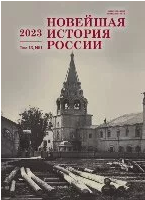Смеховые практики в годы Великой Отечественной войны в газете «Магнитогорский рабочий
Laughter during the Great Patriotic War in the Newspaper Magnitogorskii rabochi
Author(s): N. V. Chernova, N. N. MakarovaSubject(s): Media studies, Political history, Social history, Sociolinguistics, Theory of Communication, WW II and following years (1940 - 1949), Fascism, Nazism and WW II, Stylistics
Published by: Издательство Исторического факультета СПбГУ
Keywords: Humor; Great Patriotic War; caricature; feuilleton; USSR; Ural; Magnitogorsk;
Summary/Abstract: The history of humor is not new to the Russian historiography. At the same time, over the last decade, the research into laughter has been in demand and relevant, especially within the study of the history of emotions. The author suggests a specific example of the study of laughter in the local context. The article examines laughter during the period of the Great Patriotic War based on the newspaper “Magnitogorskii rabochii” in two ways. The first layer is made up of “guest” humorous sketches presented by the works of “TASS Windows” and front-line newspapers. The second — feuilletons, cartoons, humoresques posted on the pages of the city newspaper. Their authors were local journalists and artists. Local authors are understood as those who resided in the city during the Great Patriotic War. The former basically broadcast images of front-line life, explained military events, consoled people demonstrating shortcomings of the enemy and the dignity of the Soviet army. The latter, during the most difficult moments on the fronts, shifted the attention of residents to pressing urban problems, largely typical of Magnitogorsk: officials, roads, baths, etc. The article pays special attention to the influence of front-line events on laughter practices, forms of humor, themes and functions performed by it. The latter underwent significant changes during the war years. If at the beginning of the war, laughter performed an explanatory and anesthetic function helping the townspeople to cope with the difficult time of incomprehension of the events, of mobilization, of the first losses, etc., then in 1942 the substitution function became key: front-line humor was replaced by local humor. The end of the war required humor to make an effort to revive positive moods in the city, to ensure a gradual return to a peaceful existence.
Journal: Новейшая история России
- Issue Year: 13/2023
- Issue No: 42
- Page Range: 172-184
- Page Count: 13
- Language: Russian

